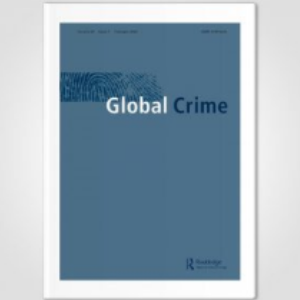
Homicide as a function of city block layout: Mexico City as case study
Focused on Mexico City, this article offers a seminal examination of the relationship between block layout and intentional homicide.

Focused on Mexico City, this article offers a seminal examination of the relationship between block layout and intentional homicide.
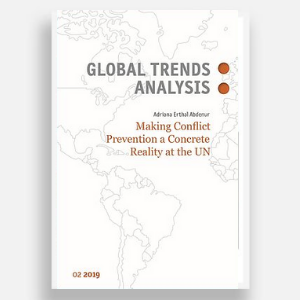
Adriana Erthal Abdenur, coordinator for International Peace and Security at Igarapé, has published the article “Making Conflict Prevention a Concrete Reality at the UN” in the peer-reviewed policy journal Global Trends Analysis, hosted by the German think tank SEF.

I study violence in Latin America, and I’ve observed a sharp increase in reports of religiously motivated crimes in Rio de Janeiro since 2016, in particular attacks on “terreiros” – the temples of the Candomblé and Umbanda faiths.
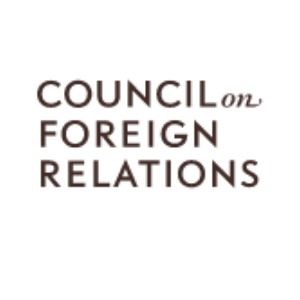
After years of procrastination, Brazil has finally adopted comprehensive data protection legislation. In mid-2018, the government approved Law 13.709, known by its Portuguese acronym, LGPD.

They came looking for gold. Earlier this year, several dozen unauthorized prospectors, or garimpeiros as they are known in Portuguese, invaded a 1.4 million acre indigenous reserve in Brazil’s remote northern state of Amapá.

Violence has always been one of humanity’s most serious global challenges. Hundreds of millions of men, women, and children have been killed or maimed by armed conflict, crime, extremism, and sexual and gender-based violence. Not only does violence exact a massive social and economic toll, it depreciates human capital and undermines important civic and social institutions.

We are facing a climate emergency. More than 11,000 of the world’s scientists and successive reports issued by the International Governmental Panel on Climate Change say the evidence of human-induced global warming is irrefutable.

Violence has always been one of humanity’s most serious global challenges. This is because for most of history, we were natural born killers. Hundreds of millions of men, women and children have been killed or maimed by armed conflict, crime, extremism and sexual and gender-based violence.
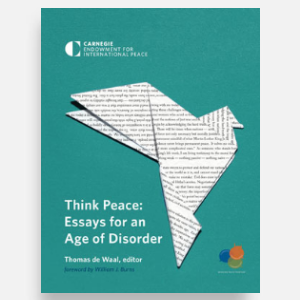
As Rachel Kleinfeld and Robert Muggah note, levels of state-to-state conflict in the world are now at historic lows. The world’s big powers confront one another by other means, whether that be proxy war in third countries, punitive trade tariffs, or digital subversion.

The world is waking-up to the climate emergency. But our prolonged slumber is going to cost us dearly. The latest scientific findings indicate that our planet is approaching multiple “tipping points” that could cause irreversible and catastrophic changes in temperature, ecosystems and biodiversity.

Make no mistake: the world is in the early stages of a techno-war against city governments and urban infrastructure. And while some cities have bolstered their capabilities to patch their vulnerabilities, they are entirely unprepared for the scale of cyberthreats that are coming.

Brazil is the world’s murder capital. No other country even comes close. That is why it was big news when the country’s minister of justice recently announced that homicide rates fell by over 20 percent in 2019 compared to the same period last year.

Cities are stepping-up to confront many of the world’s biggest existential challenges – especially climate change. One reason is that cities have always been where the future happens first; spaces that cultivate creativity, resourcefulness and innovation.

n one of the world’s most fragile and violent settings, Lieut. Comdr. Marcia Braga, a 45-year-old Brazilian naval officer, arrived in April 2018 as the third military gender adviser for the United Nations peacekeeping mission in the Central African Republic.

Igarapé’s Peace and Security Coordinator, Adriana Abdenur, contributed with the section “The Crisis of Multilateralism, Viewed From the Global South”

News coverage the catastrophic impacts of global warming are everywhere. From the Arctic to Brazil, the house is clearly on fire.

If ratified, the Mercosur-EU trade deal may reinforce the parties’ commitment to climate action. Yet, its potential relevance is weakened by a language that often stops short of concrete commitments, as well as by political resistance.

The fate of the Amazon is intertwined with the fate of the world. If 20-25 percent of its tree cover is cut down, scientists estimate, the basin’s capacity to absorb carbon dioxide would be severely compromised, taking out of operation one of the world’s largest carbon sinks.

RIO DE JANEIRO, Aug 13 2019 (IPS) – Every year, over 12,000 women are killed in Latin America. The region is plagued by extremely high levels of violence, and a vacuum of state power persists.

Sixty-two people are dead following a riot at a prison in northern Brazil earlier this week. Fifty-eight inmates were killed when a fight broke out between rival gangs at a prison in Altamira, in Para state, including 16 who were beheaded.

Brazil has struggled to contain prison violence for decades. A riot at the Altamira prison in Pará state on July 29, which left at least 62 inmates dead, revealed just how much work still needs to be done.

Robert Muggah and Renata Giannini contributed with a section for this report.

A new form of organized crime has recently been emerging in the Amazon: illegal mining. Miners fell trees, use high-grade explosives to oblast soils and dredge riverbeds.

Digital solutions are quickly filling the information vacuum plaguing the thousands of people around the world who have been displaced.

The future feels more threatening and ominous than ever. The sense of doom and gloom is deepening, not least in the West.

The greatest wave of democratisation in history is receding – and crime and violence are to blame. Latin Americans were among the most devoted converts to democracy in the late 20th century.

All coastal cities are facing sea-level rise, but some will be hit harder than others. Asian cities are in for a particularly rough ride.

Agenda 2030 is in trouble. The rare political consensus that led to the adoption of the Sustainable Development Goals (SDGs) four years ago has become fractured.

A new study by Igarape Institute, Future Crime, highlights the evidence on crime prediction tools. It also provides an overview of the opportunities and pitfalls of new technologies to fight criminality and states recommendations to ensure transparency and accountability.
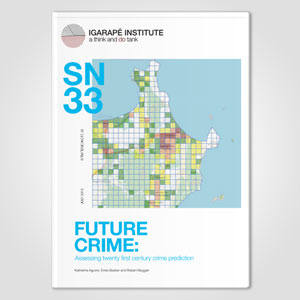
Cities are where the future happens first.

O Instituto Igarapé utiliza cookies e outras tecnologias semelhantes para melhorar a sua experiência, de acordo com a nossa Política de Privacidade e nossos Termos de Uso e, ao continuar navegando, você concorda com essas condições.

